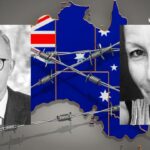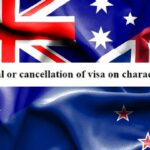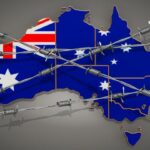NZ Delegation Puts Australian Deportation Abuses on UN Torture Agenda
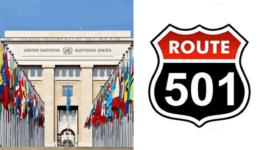
A delegation of high-level Australian officials appeared before the UN Committee Against Torture last week to participate in the nation’s four yearly review on how its tracking in terms of adherence to the 1984 Convention Against Torture (CAT), as well as, rather farcically, compliance with OPCAT.
During the proceedings, head of the delegation Attorney General Department integrity and international deputy secretary Simon Newnham listed a number of ways in which Australia observes the terms of the CAT, despite NSW having just run a team of UN rights inspectors out of town.
Newnham highlighted five areas in which Australia’s progressed since its last review. These were with First Nations people, gender-based violence, modern slavery, people with disabilities and nonrefoulement, or our international obligation not to return refugees to risk of harm.
On this last point, Newnham cited the Migration Amendment Act 2021 as proof that the government has progressed on immigration, as this legislation “clarifies that the Act does not require or authorise the removal of a person to a country to which a protection finding has been made”.
The deputy secretary, however, neglected to mention that this legislative change was chiefly to clarify that indefinite detention of such people is permissible in this country.
Yet, one aspect of our rights-denying migration law that he didn’t address is the Abbott government launched character test deportation scheme, which has led to around 7,000 noncitizens having been turfed out of the country, many of whom were long-term residents deported over minor offences.
So, that’s why deportee advocacy and support group Route 501 sent its own delegation to Geneva: to ensure that the abuses of this mass deportation regime were highlighted.
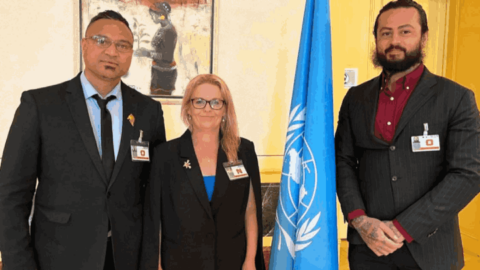
Assuming responsibility
“We came to Geneva to speak with the United Nations to tell them the truth about the torture Australia has been inflicting on people inside their immigration detention centres,” explained Route 501 founder and director Filipa Payne, whilst she was over in Switzerland.
“Many people have experienced cruel treatment and arbitrary rule in immigration detention centres in Australia,” she told Sydney Criminal Lawyers. “Australia has a duty of care to these people and that duty is routinely abrogated.”
The Route 501 delegation comprised of Payne, Felon Show podcaster David Obeda and construction project manager Moses Folau. The latter two both fell victim to 2014 amendments to the Migration Act 1958 (Cth), being deported “after having spent most of their lives living in Australia”.
All three members of the Route 501 delegation now live in New Zealand, which is due in no small part to the fact that our nation’s tightening of the migration character test and deportation scheme has overwhelmingly impacted people who were born in NZ.
And there’s enough disgust out there over the Australian government’s deportation regime that the Route 501 delegation made it to the Geneva conference solely on donations provided by supporters.
“Australia’s deportation policies need to be reformed from top to tail, applying human rights standards throughout,” Payne underscored. “Immigration detention after prison is double punishment.”
Ejecting the unwanted
In late 2014, then immigration minister Scott Morrison passed a bill, which tightened the character test in section 501 of the Migration Act, so that noncitizens sentenced to at least 12 months prison are automatically deported. This includes multiple sentences and is regardless of the crime/s.
Other amendments to section 116 provided the minister with a long list of grounds that they have the discretion to deport a noncitizen in relation to, regardless of convictions. And these include being or potentially being “a risk to the health, safety or good order of the Australian community”.
While in June this year, New Zealand born people continued to be the biggest cohort in onshore detention centres, as they have been for half a decade now. Sixty one percent of people in detention are 501 visa cancellations. And around 200 detainees were stuck in the facility on Christmas Island.
A serious misnomer
“The conditions in Australian detention are horrific, in particular at Christmas Island,” added Payne. “Thousands have been subjected to cruel and degrading treatment, shackled, and placed in solitary confinement, denied medication and medical intervention, leading to, in some cases, death.”
Payne has visited the Christmas Island facility, where prisoner abuse is rife and riots regularly break out in response. She maintains that the government uses detainment at the centre or the threat of it upon potential deportees, “as a way to pressure them into relinquishing their appeal rights”.
“There’s not one minute that passes where many in detention don’t contemplate taking their own lives because of the torture they endure,” she continued, adding that the perpetrators of the state-sanctioned abuse are SERCO guards, and ABF staff, in particular the emergency response team.
Then prime minister Morrison reopened the Christmas Island facility in early 2019, as a kneejerk reaction to Medevac laws having passed parliament. And ever since, the centre has mainly been used to subject deportees to conditions they insist are worse than those they’ve seen in prison.
“Christmas Island must be shut,” Payne went on. “Prime minister Albanese has the power and opportunity to show good will to the world by closing Christmas Island.”
The right of the lucky
Route 501 lodged two submissions with the UN Committee Against Torture in regard to the Australian deportation program, one of which detailed the cases of multiple 501 deportees, pointed out the flaws in the system and made recommendations as to what it considers should be done.
Payne explained that Andrew Rose, UN Australian Permanent Mission home affairs minister counsellor, addressed the deportation regime during proceedings, and he provided a lot of statistical information to justify the “abhorrent and ongoing brutality inflicted” upon those in detention.
“There is no justification acceptable for holding people indefinitely in detention. There is no justification acceptable for torturing and beating people in detention,” Payne stressed.
“There is no justification acceptable for tearing families apart and denying Australian children the right to be with their own parent.”
A global boycott
In terms of why it was necessary for the grassroots delegation to be in Geneva, Payne explained that its important the UN and Albanese are made aware of what’s happening on the ground from those with lived experience, rather than continue with versions filtered through official departments.
The recommendations which Route 501 raised included that those served with a deportation notice should be able to remain in the community during the appeals process, for sake of the family, for financial reasons, for the benefit of taxpayers, and to avoid the torture and trauma of detention.
Another key reform the delegation raised was that there should be a mechanism to hold the Australian government accountable for the damage it inflicts upon people in immigration detention.
The Route 501 director added that if the globe was made aware of the rights abuses our nation is perpetrating, then it wouldn’t be too hard to garner support for embargos to be placed upon Australia. And she further suggested something like the sports boycott of apartheid South Africa.
“If Australia is not willing to make changes and treat people with equality, dignity and liberty, then accountability must be placed on them,” Payne said in conclusion.
“People are dying in Australian immigration detention centres at the hands of the Australian government, and it’s time for them to be held accountable.”




